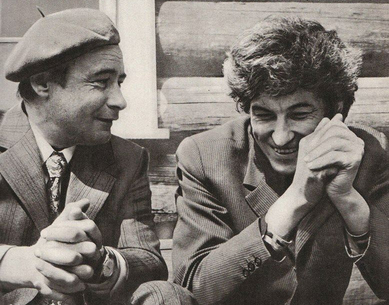“Wake up, leader!”
|
|

Caption: Two Latvian icons: The poets Ojārs Vācietis (L) and Imants Ziedoņis
Recently I came across a tantalizing mention of Ojārs Vācietis (1933-1983), an acclaimed Soviet-era Latvian poet. The note referred to the daringly iconoclastic magazine Avots. In 1987, it published
Vācietis banned poem “The Resurrection of the Leader”.
Written in 1967 in five parts with numerous stanzas, it imitated, grotesquely, a faux-impassioned Stalinist monologue. The monologue invites the “father and leader” to rise up and rescue the world.
In doing so Vācietis named and ridiculed he-who-shall-not-be-named nor blamed.
Consider the time when he wrote the poem: 1967. While Stalin was dead many years, there were many Stalinists treading the Kremlin (there still are!)
At the time, the Soviet Union was locked in a cold war with the West; the Soviets were keen to show communism superior to capitalism.
Of course, there was no private property; no freedoms of travel or of assembly or of speech but if that’s’ what it took to defeat capitalism and consummate a Workers Paradise, we’re all in. As the poem goes:
"Wake up, leader,
I am born a slave,
and there is nothing more terrible for me
than (to) live without you.
With me (do) whatever can be done,
I can be led, where wanted,
But I -
Have to be led!”*
Publishing the poem was indisputably a courageous act but one which cost him dearly. No longer a celebrated literary figure among the Soviet ruling elite, he’d now be shunned and his poetry suppressed. Bear in mind, that Baltic poets in Soviet times published in editions of 30,000 or more!
Vācietis had turned, like George Orwell, against Stalinism and other manifestations of totalitarianism: He declared, “Down with those who / lost a father with Stalin’s death / And feel like orphans!”
Khrushchev’s secret speech, (February 25, 1956), - a four hour long expose and diatribe against Stalin - was given in a closed session of the 20th Congress of the Communist Party of the Soviet Union.
Later that same year, Khrushchev demonstrated a ruthlessness equal to Stalin: his bloody suppression of the Hungarian uprising in the fall of 1956**
So, the risks for anyone challenging communism were still very real. Khrushchev’s rule ended in 1964.
Then Leonid Brezhnev ran the Soviet Union until his death in 1982.
Gorbachev and his perestroika and glasnost were still years away.
I plan to use the poem in my class this fall on Leadership & Literature at the University of Latvia as an illustration of followership/leadership (good and bad) and how literature can inform our understanding.
I’ll ask the students to consider what type of follower is Vācietis?
He certainly is not a sheep, nor a yes man, nor a go-along survivor, nor an alienated follower.
The poet is the very opposite of the poem’s cringing flatterer who yearns for the good old days of gulags and executions and resents any loosening of communism’s shackles:
“Raise up, leader!
(The) ones to be lead scream for you.
Sadists scream for enjoyment,
Abusers scream for power,
Careerists for a position,
And cowards for reckoning.”
And, the monologist would offer a chilling assistance to Stalin’s corpse to punish those who removed it from Lenin's Mausoleum:
“I have a little notebook,
And there are from place
Words, words and words -
Who carried,
Who tugged,
Who laughed,
Who said
And also all who did not say.
With all children,
And relatives, and relatives' relatives.”
I hope my students will find personal and historical insights into this courageous follower, Ojārs Vācietis. What would they do were they in the poet's shoes? Is the poem a foolish artistic suicide? Why don't followers of bad leaders speak out?
Khrushchev worked with Stalin, yet never spoke out. Why? Presumably, had he gone against Stalin, he'd have earned a bullet in the brain. To survive, why then wait until 1956 (three years) to tear the mask off?
*English translations provided by my cousin, Dace Lubane.
**I remember buying and reading a special editions of the USAs LIFE Magazine with dozens of photographs of the uprising and the Soviet reprisal. America was no longer confused about communism.
© Copyright John Lubans 2020
 John Lubans - portrait by WSJ
John Lubans - portrait by WSJ